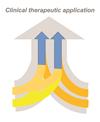|
S15 Gene and cell based therapies to counteract neuroretinal degeneration
Stefanie Hauck (Neuherberg) and Knut Stieger (Giessen)
Live Discussion: Thursday, March 25, 2021, 17:00 - 18:00h
Inherited retinal diseases (IRD)s are a group of devastating rare diseases with continuous progression of visual impairment. The loss of visual function is mostly due to degeneration of the light-sensitive photoreceptor cells in the retina. Patients affected by IRDs are severely handicapped in today’s society, which increasingly relies on rapid (visual) communication.
Gene and cell based therapies take centre stage in the attempt to find effective ways to treat rare diseases. Within the DFG funded SPP2127, we focus on the central themes that are currently at the height of debate of improving and advancing the field. The overall goal of the SPP2127 is to develop methods and tools for efficient gene or cell based therapies for IRDs and their clinical evaluation to start clinical trials in human patients at the end of the funding period of six years in 2024.
Participants within the SPP work on emerging fields that include but are not limited to CRISPR-Cas technology to modify the genome, ipSC culture systems and 3D retinal organoid development, viral vector assessment, and large animal models such as pigs and nonhuman primates on the preclinical side. Furthermore, this SPP comprises clinical projects including functional MRI, adaptive optics, and the design of objective functional readout parameters and state of the art questionnaires to be ready for testing the newly developed therapies at the end of the six-year period.
The retina is a neuronal tissue that displays a well-described circuit organization and is at the same time easily accessible. Thus, new data generated in this organ will have tremendous impact on the treatment of other degenerating neuronal disorders and monogenic diseases in general.
The major points arising in this striving field have been allocated to four main topics that are closely related and intercalate with each other: (i) gene based therapies, (ii) cell based therapies, (iii) identifying factors influencing the outcome of gene and cell based therapies, and (iv) development of new read-out parameters. They represent the four pillars of the SPP, and all ongoing projects can be allocated to one of them.
|

We gratefully acknowledge the financial support of PeproTech.
|
 |
|
|